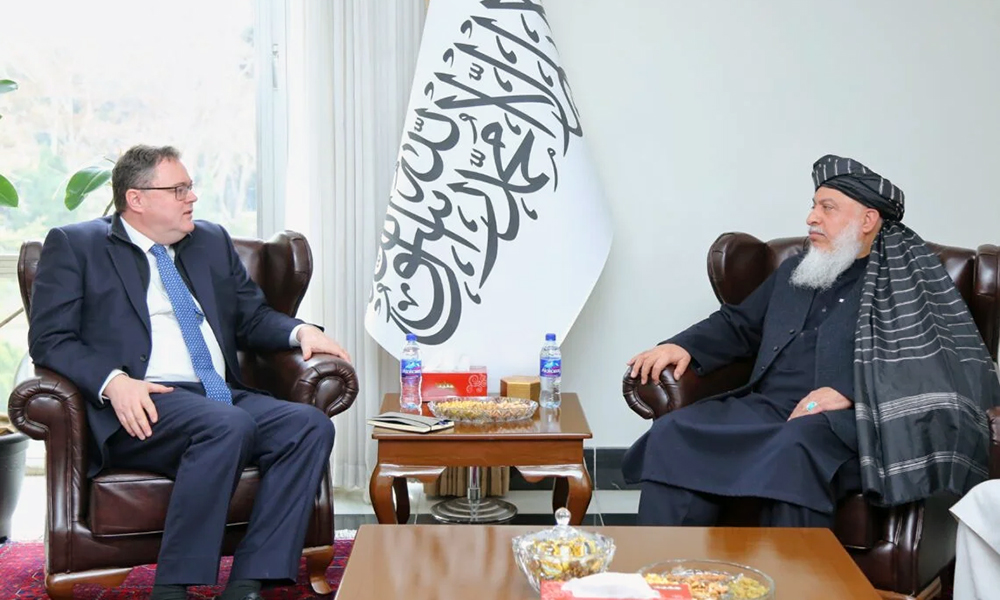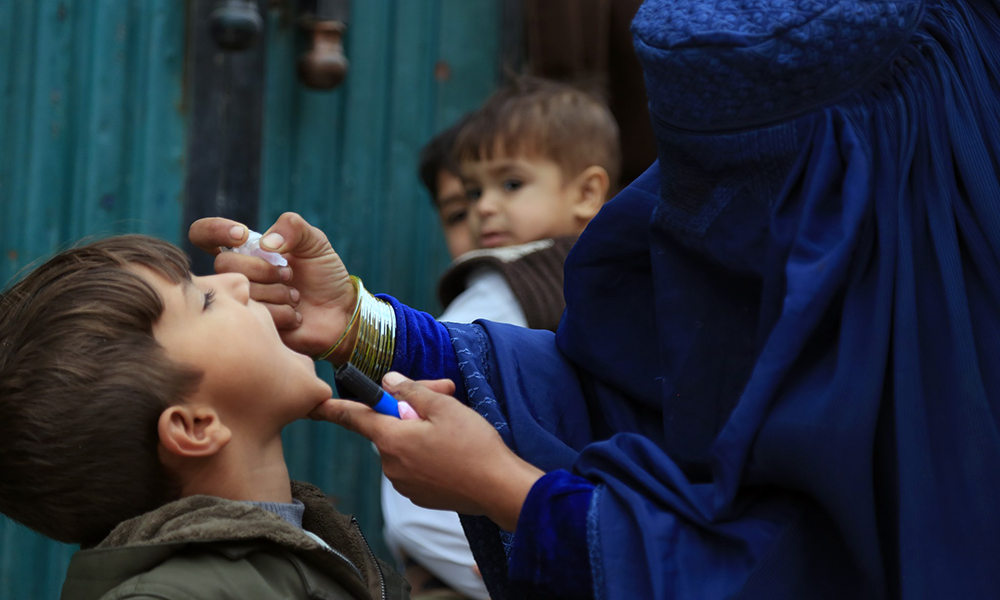Latest News
State Department review of 2021 Afghanistan evacuation critical of Biden, Trump

A US State Department report on Friday criticized the handling of the 2021 evacuation from Afghanistan, saying decisions by President Joe Biden and his predecessor Donald Trump to withdraw troops had "serious consequences for the viability" and security of the former US-backed government.
Adverse findings in the report also reflected badly on Secretary of State Antony Blinken, without naming him. They included the department's failure to expand its crisis-management task force as the Islamic Emirate of Afghanistan advanced on Kabul in August 2021 and the lack of a senior diplomat "to oversee all elements of the crisis response."
"Naming a 7th floor principal ... would have improved coordination across different lines of effort," said the report, referring to the State Department's top floor where Blinken and senior diplomats have offices, Reuters reported.
The review, and a similar Pentagon study, contributed to a report released by the White House in April. But the State Department review's critical findings were not reflected in the White House report.
White House press secretary Karine Jean-Pierre defended Biden's handling of the Afghan pullout.
"He had to make a decision," she told reporters on Friday. The United States had poured "billions of dollars into a war with no end in sight" and that "he wanted to stop that, he wanted to end that," she said.
Steven Cheung, a spokesman for Trump, wrote in an email: "There’s only one person responsible for the disastrous pullout of Afghanistan — Joe Biden,"
The White House report effectively blamed the chaotic US pullout and evacuation operation on a lack of planning and troop reduction rounds by Trump following a 2020 deal with the Taliban to withdraw US forces.
"I can't speak to that internal coordination piece and how the administration settled on the core conclusions that it presented" in April, a senior State Department official said.
The official, briefing reporters on condition of anonymity, declined to say why the review dated March 2022 was withheld from release until the eve of the July 4 holiday weekend, Reuters reported.
The State Department released 24 pages of an 85-page After Action Report - the rest remained classified - on its handling of the evacuation operation launched as the last US-led international forces departed after 20 years of backing successive Kabul governments against the Taliban.
While those decisions were outside its scope, the review said that "during both administrations there was insufficient senior-level consideration of worst-case scenarios and how quickly those might follow."
A White House spokesperson disputed that conclusion. He pointed to a White House report finding that there were extensive meetings and tabletop exercises to explore evacuation scenarios as part of the planning process, including contingencies "actually worse than the worst-case predictions."
The State Department review said department planning "was hindered" because it was "unclear" which senior official "had the lead."
Senior administration officials also failed to make "clear decisions regarding the universe of at-risk Afghans" to be included in the evacuation by the time it started nor had they determined where Afghan evacuees would be taken, it said.
Preparation and planning "were inhibited" by the Biden administration's reluctance to take steps that could signal a loss of confidence in the Kabul government "and thus contribute to its collapse," the review found.
Latest News
Norwegian Chargé d’Affaires meets with IEA deputy foreign minister
Welcoming the diplomat’s visit to Kabul, Stanikzai underscored the importance of political relations between Afghanistan and Norway, the foreign ministry said in a statement.

The Norwegian Chargé d’Affaires for Afghanistan, Per Albert Ilsaas, on Saturday met with IEA’s Deputy Foreign Minister for Political Affairs, Sher Muhammad Abbas Stanikzai, in Kabul.
Welcoming the diplomat’s visit to Kabul, Stanikzai underscored the importance of political relations between Afghanistan and Norway, the foreign ministry said in a statement.
In addition to focusing on bilateral political, humanitarian, and other pertinent issues, the two sides expressed hope that continued engagement would lead to constructive solutions to related issues.
This comes two weeks after the Foreign Ministry Spokesman Abdul Qahar Balkhi expressed disappointment regarding the decision by the Norwegian government to downgrade diplomatic relations with Afghanistan.
Balkhi said in a post on X that such decisions should not be linked with internal affairs of other countries.
“Diplomatic engagement is most effective when it fosters mutual understanding and respect, even amidst differing viewpoints,” he stated.
“Access to consular services is a fundamental right of all nationals. We strongly urge all parties to prioritize this principle in the spirit of international cooperation,” he added.
Latest News
A new polio vaccination campaign is set to launch in Afghanistan
Afghanistan and Pakistan are the only two countries in the world where polio has not been eradicated.

The “Afghanistan Polio-Free” organization announced that a new round of polio vaccinations will begin on Monday, December 23, in various provinces of Afghanistan.
The organization did not specify which provinces will be targeted or how long the vaccination campaign will last.
Afghanistan and Pakistan are the only two countries in the world where polio has not been eradicated.
On December 4, 2023, the World Health Organization (WHO) issued a statement reporting a 283% increase in polio cases in Afghanistan. According to the WHO, the number of positive environmental samples for wild poliovirus type 1 in Afghanistan in 2024 reached 84, compared to 62 cases in 2023.
The Ministry of Public Health claimed in November 2024 that no new cases of polio had been reported in Afghanistan for the year.
Latest News
G7 envoys urge national dialogue for lasting stability in Afghanistan

Special Representatives of the Group of Seven (G7), including the European Union, have emphasized the importance of a national dialogue for achieving long-term stability in Afghanistan.
Following a meeting on Afghanistan in Geneva, Switzerland, G7 special envoys issued a joint statement calling for the restoration of women's rights and urging the Islamic Emirate to fight terrorism.
The statement reads: "Achieving sustainable peace and stability requires credible governance that represents all segments of Afghan society."
The representatives also expressed concern over the IEA’s decision to ban girls from attending medical institutes, warning that it will have devastating consequences for the citizens, particularly mothers and their infants.
The statement described this ban as unacceptable and called on the Afghan authorities to lift it immediately.
Earlier, countries and international organizations had called for the removal of restrictions on the education and employment of women and girls, emphasizing the need for a national dialogue.
In response to these concerns, IEA has repeatedly stated that it will not allow interference in the internal affairs of the country.
The G7 special envoys also expressed their concern about the recent terrorist attacks in Kabul and the surrounding region, warning that terrorism remains a serious threat to Afghanistan's security. They confirmed the actions of the IEA against Daesh but stressed the need for more decisive measures.
-

 Sport5 days ago
Sport5 days agoLanka T10: All three matches abandoned due to rain
-

 Latest News5 days ago
Latest News5 days agoIndia hoping to import coal and marble from Afghanistan
-

 Sport4 days ago
Sport4 days agoZimbabwe’s opening ODI against Afghanistan abandoned
-

 Latest News5 days ago
Latest News5 days agoJapan announces $27.5 million aid package to Afghanistan
-

 World3 days ago
World3 days agoNorth Korean troops suffer 100 deaths, struggling in drone warfare, South Korea says
-

 Latest News3 days ago
Latest News3 days agoTwo horror accidents on Kabul-Kandahar highway leave 52 dead
-

 Latest News1 day ago
Latest News1 day agoAfghan men must stand with women to support viable future of country: US envoy
-

 International Sports4 days ago
International Sports4 days agoLanka T10: Kandy Bolts in at 4th spot in playoffs after thrilling day
























